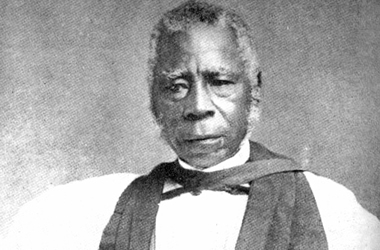A SERMON DELIVERED BY VENERABLE OLAYEMI FATUSI Ph D TO COMMEMORATE AJAYI CROWTHER DAY ON THURSDAY 3 OCTOBER 2024 AT AN EVENSONG AT THE CATHEDRAL CHURCH OF THE ADVENT OF CHURCH OF NIGERIA ANGLICAN COMMUNION ABUJA.
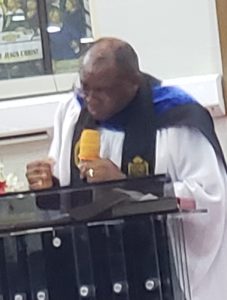
TOPIC: THE ENDURING IMPACT OF BISHOP SAMUEL AJAYI CROWTHER’S MISSIOLOGICAL PRACTICES AND MINISTRY: LESSONS FOR THE CONTEMPORARY CHURCH
Collect for Samuel Ajayi Crowther’s Day:
Almighty God, the light of the faithful and shepherd of souls,
who sent Your servant Ajayi to be a Bishop in the Church to
feed Your sheep by Your word and guide them by Your
example; give us grace to keep the faith which he taught
and to follow in his footsteps; through Jesus Christ our Lord.
Amen.
- Introduction
Samuel Ajayi Crowther (1809–1891) was a pioneering missionary whose legacy continues to resonate within the church today. He is popularly known as the slave boy who became a Bishop! He was never a slave to any colonial or white man, but was captured and sold into slavery six times by people of his color and affinity. Ajayi’s last slave masters were Portuguese slave dealers in Lagos Island who put him on board the slave merchant ship to be transported to the New World through the Atlantic. Crowther was freed in April 1822 from slavery at a coastal port by the Royal Navy’s West Africa Squadron, which was enforcing the British ban against the Atlantic slave trade. Although, Slave Trade was abolished in Britain in 1807 and United States of America in 1808 but slave trading continued into late 1860s. The liberated slaves were resettled in Sierra Leone. The land was acquired through the efforts of the Evangelical brethren like the Clapham Sect. In Sierra Leone, Ajayi adopted the English name of Samuel Crowther and began his education in English
For Crowther’s early life, for want of time, permit me to refer you to two books, first the work of Professor Ade Ajayi, an erudite Anglican Scholar- Christian Missions in Nigeria, 1841-1891: The Making of a New Elite. Ibadan History Series (London:1965) Secondly, Jeanna Decorvet and Emmanuel Oladipo, Samuel Ajayi Crowther, Lagos CSS, 2006.
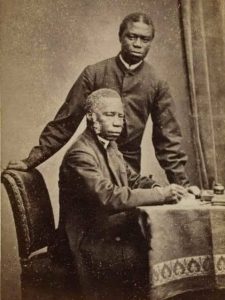
Samuel Ajayi Crowther, though not the first African Anglican clergy, he played a significant role in shaping Christian missions in 19th-century Africa. His ministry was characterized by a commitment to contextualization, Bible translation, and the development of indigenous leadership. These contributions laid the foundation for spreading Christianity across West Africa and set an example for how the contemporary church can approach missions in a rapidly changing world.
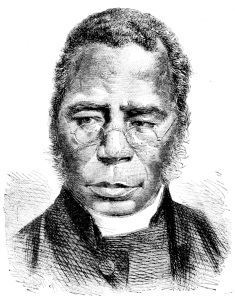
As the first African Anglican bishop, consecrated by Most Revd. Charles Longley Archbishop of Canterbury on St Peter’s Day in 1864, his Episcopal See was the whole of West Africa outside regions under colonial residents and control. What has been described by different scholars as an “ambiguous mandate” and a “leap of faith”. Samuel Ajayi Crowther as a missionary bishop was given a blank page and commanded to fill it in with a network of Christian communities that the Anglican Church could recognize as its own in the Africa Continent. The definition of his Episcopal See affected his missionary movements and travels, he had to avoid areas and churches where colonial clergy served as priests. In no doubt, Ajayi Crowther was a pioneering figure whose missiological practices and ministry left an indelible mark on Christian missions in Africa and the entire world. He is a man who saw beyond his generation. His unique approach, practices, and mission philosophy are still a major research discourse in the 21st Century. Andrew Walls, the erudite Christian historiographer captures the essence and impart of Bishop Samuel Ajayi Crowther’s life and ministry thus, “He is the most widely known African Christian of the nineteenth century.” Today, the global South is regarded as the center of gravity of Christianity. Inarguably, Bishop Samuel Ajayi Crowther’s ministry is indeed a major contribution to this global mission shift. Lamin Sanneh has posited, that the inaugural evangelical Anglican ministry set out by Crowther makes his efforts a credible contribution to World Christianity. African Christian Missions was shaped by his personal experiences as a former slave, Conversion, Evangelical Convictions, and his deep understanding of African culture and languages.
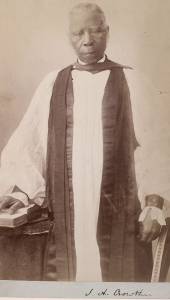
Crowther’s unparalleled commitment to reaching the unsaved with the Gospel of Jesus Christ contributed significantly to the growth of Christianity on the continent. This paper explores the “Enduring Impact of Bishop Samuel Ajayi Crowther’s Missiological Practices and Ministry: A Lessons for the contemporary church” looking at his contributions to missiology, focusing on his methods of contextualizing the Gospel, promoting Bible translation, Entrepreneurial skill as a missions strategy and advocating for indigenous leadership in the church. Additionally, the paper highlights the lessons contemporary churches can draw from Crowther’s ministry, especially in addressing modern missiological challenges such as cultural sensitivity, evangelization in diverse contexts, and the empowerment of local church leaders.
CROWTHER’S MISSIOLOGICAL PRACTICES
Contextualization of the Gospel
One of the most significant contributions of Bishop Crowther was his emphasis on contextualizing the Gospel. Unlike many Western missionaries who imposed European cultural practices on African converts, Crowther sought to present Christianity in ways that resonated with the African context. He believed that the Gospel should be adaptable to local cultures and customs without compromising its core message. This approach allowed African converts to retain their cultural identity while embracing the Christian faith.
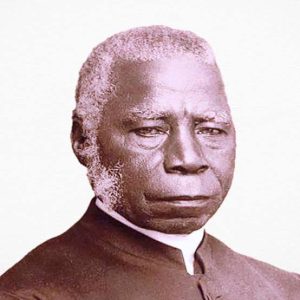
Crowther’s respect for African traditions and his ability to navigate between the Christian faith and African worldviews made him an effective missionary. For instance, Crowther encouraged African Christians to continue using traditional music and arts in worship, while guiding them toward practices that were compatible with Christian ethics. This form of cultural engagement is a vital lesson for contemporary churches, which often struggle with how to present the Gospel in culturally diverse settings.
Bible Translation and Linguistic Contributions
One of Crowther’s most enduring legacies is his contribution to Bible translation. He recognized that one of the most effective ways to spread the Gospel was by translating the Scriptures into local languages, thus making it accessible to the people. Crowther translated the Bible into Yoruba and played a significant role in developing written forms of several other African languages, including Igbo and Nupe.
Crowther’s linguistic skills and his commitment to Bible translation were instrumental in making Christianity more relatable to African converts. His work in translation went beyond mere language—it was an act of cultural affirmation, as it validated the worth of African languages in the communication of Christian truths. For the contemporary church, the lesson is clear: translation and communication of the Gospel must be done in the vernacular of the people, both in language and in cultural relevance. Crowther’s ministry was incarnational, he identified with people and influenced their lives positively.
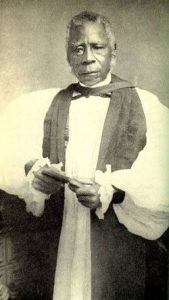
Entrepreneurial skill as a Mission’s strategy
One of the painful accounts in Crowther’s ministry is the short-lived and misconstrued Entrepreneurial skill and lay ministry Training center at Lokoja, The Preparandi. Lokoja was one of his Strategic Mission stations. Crowther established many strategic mission stations like in Otta, Onitsha, Bonny, etc across his episcopal oversight area. The Preparandi Institution was Crowther’s Holistic Missionary training vision, an adaptation from his educational exposures. Preparandi was to be a place for training in entrepreneurship, medicine, and building skills. The Institution Building was completed in 1887, the same year that saw its first graduates, who had entered in 1883. Its two buildings were so inspirational that they were decried as ‘extravagant’, ‘Wastage’, and ‘an obstacle to the progress of Christianity’ by the Sudan Party, three ‘young, over-zealous missionaries’ from the University of Cambridge, who sold the two buildings to the Royal Niger Company for £1,500 in 1889.
The main aim of establishing the Preparandi was to reach the Muslim-dominated Northern Nigeria and beyond through an unconventional missionary training program. One cannot imagine the impact that vision would have made in advancing the frontiers of God’s kingdom but for the onslaught of the devil through the spiritual insensitivity of the three ‘young, over-zealous missionaries’. The approach of Crowther is what is called, Access Ministry or Business as Missions Strategy today in Missions circles. Crowther intended to facilitate the long-term flourishing of individuals and communities, creating an avenue for both economic empowerment and the spread of the gospel.
Indigenous Leadership Development
Another key aspect of Crowther’s missiological practice was his advocacy and strong intentional effort toward Indigenous leadership both in the Church and Society. As an African bishop, Crowther served as a powerful symbol of the potential and ingenuity of indigenous leadership. A lesson he learned from one of his mentors, Henry Venn who promoted the Three-Self Principles in Cross-Cultural Missions: Self-Governing, Self-Financing, and Self-Propagating. He believed that African Christians were fully capable of leading their churches, without the need for continuous Western oversight. Through his mentorship and leadership, the Anglican Churches in the Niger Delta Area became truly indigenous and strongly self-funding, Self-Governing and Self Propagating.
Crowther’s ministry emphasized the importance of training local leaders who understood both the Christian faith and the cultural context of their communities. He championed the idea that local leaders were better positioned to communicate the Gospel and lead the church in ways that were culturally appropriate and spiritually effective. For contemporary churches, especially those involved in missions, Crowther’s model provides a blueprint for empowering local believers and developing sustainable, self-sufficient churches. In collaboration with Captain J. P. L. Davies, he established in Lagos ‘The Academy’ (a social and cultural center for public enlightenment) in 1866.
HIGHLIGHT OF LESSONS FOR THE CONTEMPORARY CHURCH
Handling Persecution and Pain in Missions Work:
Crowther was a leader acquainted with the pains and hardships of missions and ministry. One would assume he would not want to see his captors nor have anything to do with his slave masters. On the contrary, without any aorta of bitterness, he reached out to some of the people with the gospel. He traversed areas he was once a slave to preach the gospel.
In line with his Episcopal jurisdiction, he carefully avoided clashes with Colonial missionaries and rather took a longer route in carrying out his work. His resilient spirit is worth emulating, He will pay repeated evangelistic visits to villages he was once tortured and reprimanded, especially around the Nupe land. When his translated Yoruba Bible got burnt, he immediately began a new one, which became the first translated Bible in Nigeria.
Cultural Sensitivity in Missionary Work
Crowther’s emphasis on contextualization offers valuable lessons for contemporary churches, particularly regarding cultural sensitivity. In today’s globalized world, where the church must navigate a wide array of cultural contexts, missionaries and church leaders need to avoid the imposition of foreign cultural norms. Instead, like Crowther, they should seek to present the Gospel in ways that resonate with local cultures, taking advantage of indigenous traditions for gospel sharing where possible without compromising the message of Christ.
The Role of Bible Translation in Evangelization
Crowther’s work in Bible translation remains a cornerstone of missiological practice. Today, with many local dialects and languages almost in extinction, the importance of making the Scriptures accessible in the heart languages of diverse people groups cannot be overstated. Contemporary churches involved in missions must continue to support efforts that prioritize Bible translation and literacy programs in indigenous languages. This not only aids in the spread of the Gospel but also promotes cultural dignity and the sustainability of the faith within local communities.
Empowerment of Indigenous Leadership and Aggressive Evangelism
The contemporary church must take seriously the call to empower indigenous leaders, especially in mission contexts. Crowther’s insistence on the development of local leadership challenges churches today to rethink their approach to missions, moving away from models that rely heavily on expatriate leadership. Henry Venn once described this as the ‘Euthanasia of Missionary’ pointing to the vital process whereby a foreign mission becomes progressively indigenous and independent. Churches should prioritize the training and support of local leaders who can lead their congregations in culturally authentic ways. Indigenous leadership fosters self-sufficiency and allows the church to grow organically within its cultural environment, as captured in his Bishop Charge.
Conclusion
The life and ministry of Bishop Samuel Ajayi Crowther offer timeless lessons for the contemporary church. No doubt he was an icon with lots of positive sides but he is not without weaknesses. He was a little remiss when it came to prompt discipline of immoral workers and clergy. This was well captured in a statement by CMS Finance Committee report, “as observed about staffing decisions in the Niger bishopric, Crowther was confronted with a choice between “a defective staff capable of reformation and none at all”. Secondly, He was in no doubt a workaholic, who jettisoned rest. Overall, his emphasis on contextualizing the Gospel, his work in Bible translation, his emphasis on Entrepreneurial skill training, and his advocacy for indigenous leadership remain highly relevant today, especially as the church continues to grow in culturally diverse and pluralistic contexts. Crowther’s missiological practices remind us that the Gospel transcends culture but must also engage culture in meaningful ways. For churches and missionaries today, the challenge is to learn from Crowther’s example and adapt his principles to the contemporary mission field, ensuring that the message of Christ remains relevant, accessible, and transformative across all cultural boundaries.
References
Ajayi J. F. A. Christian Missions in Nigeria: 1841–1891. London: Longmans, 1965.
Babalola, E. O. (2006). Samuel Ajayi Crowther: The Father of African Christian Mission. Daystar Press.
Emmanuel A. S. Egbunu. 2021. Pathfinders for Christianity in Northern Nigeria (1862—1940): Early CMS Activities at the Niger—Benue Confluence
Hastings, A. (1979). A History of African Christianity: 1950–1975. Cambridge University Press.
Jeanna Decorvet and Emmanuel Oladipo, Samuel Ajayi Crowther, Lagos CSS, 2006.
Sanneh, L. (2003). Whose Religion is Christianity?: The Gospel Beyond the West. Eerdmans.
Walls, A. F. (1996). The Missionary Movement in Christian History: Studies in the Transmission of Faith. Orbis Books.
Share your story or advertise with us: Whatsapp: +2347068606071 Email: info@newspotng.com

